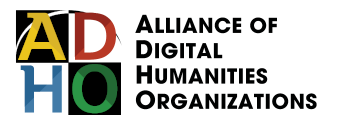The Communication team advises on ADHO’s overall communications strategies and manages public communications channels via the ADHO website, social media, and related email lists. They also provide guidance on how to improve its web site, social media presence, and visibility as an inclusive, diverse organization.
Communications Officers
- Communications Officer: Nadezhda Povroznik is currently a Research Associate at the Humanities Data Science and Methodology (HDSM) in the Institute for History at the Technical University of Darmstadt. Her areas of interest include Digital Humanities, Digital History, and Virtual Museology. She brings over 15 years of relevant academic experience, encompassing international collaborations and publications. Nadezhda Povroznik is a member of the editorial board of the Journal of Digital History, which is issued by C2DH at the University of Luxembourg and published by De Gruyter. Additionally, she serves as a guest editor for the Journal of Internet Histories, particularly for the Special Issue on Museums on the Web. From 2021 to 2023, she was a co-chair of CenterNet, an international network of Digital Humanities Centers affiliated with ADHO.
ADHO Communications Fellows
ADHO’s Communications Fellowship is offered annually for 2 students, early career scholars, and/or practioners in digital humanities. Fellows work several hours per week to promote information shared by ADHO, its COs, Journals, and SIGs. They also take on special projects as identified by the COB and/or EB.
2024:
- Vera Zoricic (PhD-Student, University of Waterloo): Vera examines the construction of cultural memory and ever-changing digital archives.
- Lavanya Dahiya Lavanya Dahiya is a sociologist by training working at the intersections of society and technology. She, along with her colleagues, is a proud joint recipient of the prestigious Paul Fortier Prize at the DH2023 annual conference of ADHO held at the University of Graz, Austria for their work on the current Digital Humanities curricula and pedagogical trends in Indian higher education institutions.
2023 & 2024:
- Alexandra Núñez (2023-2024) is a PhD candidate in German linguistics at the Technical University of Darmstadt and has a wide range of research interests. She holds a Magistra Artium (M.A.) (eq. BA+MA) degree in Art History and German Philology, is a certified AI product manager, and also works as a scientific reviewer, advisory board member and AI consultant.
- Damir Padieu (2023-2024) is a master’s student in Digital Humanities with a bachelor’s degree in Chinese studies. He is currently completing his master’s degree at Trier University and working as a research assistant at Trier Center for Digital Humanities. His DH research interests include network analysis, linked open data and TEI. He is passionate about open source principles and self-hosting.
2021 & 2022:
- Erdal Ayan is currently a PhD candidate in the department of English and American Studies at University of Kassel and a part-time master student in the Web Science Master Program at TH-Koeln.
- Anna Sofia Lippolis is a Research Fellow at Italy’s National Research Council (CNR)’s Institute for Cognitive Sciences and Technologies (ISTC).
2020:
- Mariana Zorkina is a PhD student at the Asien-Orient-Institut at the Zurich University. She received her MA in Asian and African Cultures at the St. Petersburg State University with a project on reflection of Daoism in Chinese literature. Currently she studies Tang dynasty “poems on things” and is applying computational methods to the study of language patterns in poetry. She is actively promoting quantitative approaches in literature studies, has introduced courses on Digital Humanities to two universities and has given several public talks on the topic. Before joining ADHO communications team, she acted as editor-in-chief in a Russian online media on Digital Humanities, ‘Sysblok’.
- Nabeel Siddiqui is an Assistant Professor of Communications at Susquehanna University. His research focuses on the digital humanities, the history of information science, communications, new media rhetoric, and science and technology studies. Currently, he is completing a manuscript entitled Byting Out the Public: Personal Computers and the Private Sphere, which analyzes the personal computer’s domestication during the 1970s and 1980s.
2017-18:
- Randa El-Khatib
- Anna-Maria Sichani
2016-17:
- S.E. Hackney
- Maribel Hidalgo Urbaneja
2015-16:
- Candice Lanius
- Pietro Santachiara
2014-15:
- Hannah Jacobs
- Jesica Jayd Lewis
